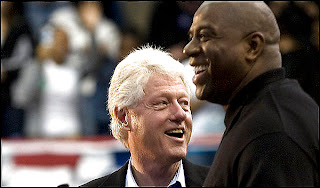Nevada was a big win for Romney, and a vindication for everything I've seen in the races so far, namely:
- The press loves McCain, and his victory in South Carolina gained much more press time than Romney's victory in Nevada.
- Therefore, McCain supposedly moves into Florida with "strong wind at his back" (not my words, but the pundits on CNN) while Romney?
- When voters cast votes based on issues and not likeability, Romney clearly leads the field
- Ron Paul is a strong candidate, who will continue to gain momentum, and whose delegates may play a role in deciding the nominee.
The best political website I've found for following the whole Huckabee -- I mean hullabaloo -- is CNN/Election/2008. It's layout is very clean, and easy to follow. It does an adequate job for giving you the raw data on a macro scale that you'd need to follow the races.
However, CNN and every other site I've found does a bad job at describing things at the state level. I had to go to the Republican Party of Nevada's website and read their bylaws to figure out that each county can determine how they split their delegates. Now I hear that Florida is winner-take-all. Iowa divided their state delegates by percentage of state popular vote. Michigan gave delegate to the winner of each county (hence Romney won 39% of the vote, but took home 80% of the delegates).
So, when we look at Nevada by county, what do we find?
Overall, we can see that Romney did not win every county. Nye county was narrowly won by Ron Paul (34% to 33%).
In fact, when we look at Ron Paul's results by county, we can see clear support in the southern counties of Nevada.
Nye county is the largest county in Nevada and one of the largest in the USA. The Federal government owns about 92% of that land. Which two Republican candidates profess most strongly to reducing the size of the federal government? Paul and Romney.
Also, the county has a population of about 42,000 according to US government estimates (the 2000 census said ~32k). I think the county seems sparsely populated by individualistic people, tailor-made for Paul.
The largest town is Pahrump, about an hour outside of Las Vegas. It's one of the fastest growing towns in America, and predominantly because of people who want to work in booming Vegas, but don't want to live there. Again, I see individualistic in nature.
If we look at Romney's results we see he won every other county. By county, he clearly had the most support in the counties along the Utah border (Elko, White Pine, Lincoln, Clark).
Clark county, where Las Vegas is located, has a large percentage of Mormons. In fact, the Church of Jesus Christ of Latter-day Saints, to which Romney belongs, has one of its temples in Las Vegas. Romney won Clark county with 58% of the vote. According to CNN, he won 94% of the Mormon vote statewide. So it makes sense that his strongest counties of support would be close to Utah, with probably high Mormon populations.
However, Romney did quite well in the counties on the other side of the state as well (Washoe, Lyon, and Douglas). These counties lie around Carson City and Reno. They also lie along the California border. This tells me two things. First, Romney gained a lot of support in the population centers of Nevada because of his strong economic track record. People in Las Vegas were worried about the economy, and when voters worry about the economy, they have voted for Romney in every primary/caucus so far.
Second, contrary to popular belief, Utah is not the state with the most Mormons in it -- California is. If Californian Mormons are politically active, he might have a strong, pre-formed base of support when the race turns to the West Coast. Just as Huckabee has to be seen as a favorite in the bible belt states because of his evangelical Christian background, Romney should be seen as much stronger in California than currently presumed. The results from the western counties of Nevada give us some inkling of that.
Huckabee got as close as 27% in one county, Mineral, but it is a very sparsely populated county and an aberration from his results as a whole. Huckabee might do well in the evangelical-laden Southern California, but he's iffy on California as a whole because I think he doesn't resonate with western voters, as shown by Nevada.
Giuliani is playing do or die in Florida.
McCain, surprisingly, didn't get any more than 22% in a county, but he did come in second in 9 counties (the most of any candidate). This confirms the one thing the other states have shown and pundits HAVE talked about -- he is a force in the race this year.
Thompson got as high as 18% in rural Pershing. I think he is a fourth place candidate at best, because of poor campaign management, but it should wake people up that he is not out, and might do well in Tennessee and Kentucky -- near his home.
Next up, Super Tuesday.







